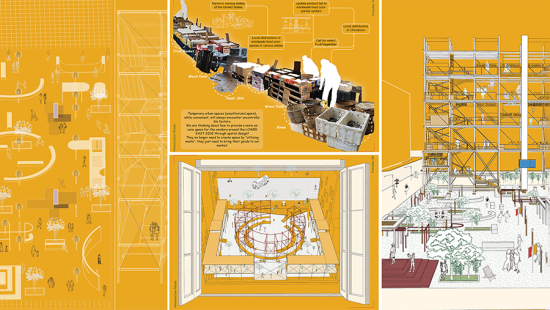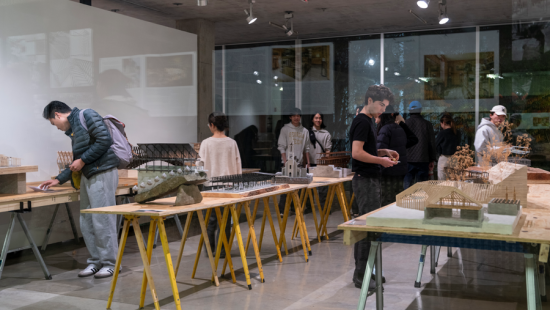Book Launch | Husserl and Spatiality: A Phenomenological Ethnography of Space

Anson Wigner / AAP
Overview
Please join the Department of Architecture for a presentation by the author and discussion with colleagues for the launch of the book Husserl and Spatiality: A Phenomenological Ethnography of Space, by Tao DuFour and published in 2022 by Routledge. Participants will include Tao DuFour, Jeremy Foster, Maria Goula, and Viranjini Munasinghe, moderated by Sean Anderson. This event is accompanied by an exhibition of associated photographs and field notes from DuFour's fieldwork in Brazil.
Husserl and Spatiality is an exploration of the phenomenology of space and embodiment, based on the work of Edmund Husserl. Little known in architecture, Husserl's phenomenology of embodied spatiality established the foundations for the works of later phenomenologists, including Maurice Merleau-Ponty's well-known phenomenology of perception. Through a detailed study of his posthumously published and unpublished manuscripts on space, DuFour examines the depth and scope of Husserl's phenomenology of space. The book investigates his analyses of corporeity and the "lived body," extending to questions of intersubjective, intergenerational, and geo-historical spatial experience, what DuFour terms the "environmentality" of space.
Combining in-depth architectural philosophical investigations of spatiality with a rich and intimate ethnography, Husserl and Spatiality speaks to themes in social and cultural anthropology, from a theoretical perspective that addresses spatial practice and experience. Drawing on fieldwork in Brazil, DuFour develops his analyses of Husserl's phenomenology through spatial accounts of ritual in the Afro-Brazilian religion of Candomblé. The result is a methodological innovation and unique mode of spatial description that DuFour terms a "phenomenological ethnography of space." The book's profoundly interdisciplinary approach makes an incisive contribution relevant to academics and students of architecture and architectural theory, anthropology and material culture, philosophy, and environmental aesthetics.
Participants
Sean Anderson was the Associate Curator in the Department of Architecture and Design at the Museum of Modern Art (MoMA) before returning to Cornell as an Associate Professor in Architecture and Director of the B.Arch. Program. A Fellow of the American Academy in Rome with a P.h.D. in African Art History, he has practiced as an architect and taught in Afghanistan, Australia, India, Italy, Morocco, Sri Lanka, and the United Arab Emirates. He has authored books on South Asian ritual sculpture, the modern architecture of colonial Eritrea, and coedited a volume dedicated to contemporary architecture and design in Sri Lanka. In 2020, he co-curated the exhibition On Muzharul Islam: Surfacing Intention at the Dhaka Art Summit in Dhaka, Bangladesh. At MoMA, he organized the exhibitions Insecurities: Tracing Displacement and Shelter (2016-17); Thinking Machines: Art and Design in the Computer Age, 1959-89 (2017–18); and four iterations of the Young Architects Program at MoMA PS1. He has also been responsible for or collaborated on permanent collection galleries including the ongoing Building Citizens and 2019's Surrounds. He co-organized with Mabel O. Wilson, Reconstructions: Architecture and Blackness in America, the first exhibition ever at MoMA to highlight the work of African American and African Diasporic architects (February 27–May 31, 2021).
Tao DuFour is an Assistant Professor at the Department of Architecture at Cornell University. His work investigates questions of embodied spatial experience, intersubjective and intergenerational understandings of architecture, landscape, and territory, and the ways in which these both constitute and are embedded in the historicity of environments. His interests are in the phenomenology of perception and corporeity, phenomenological accounts of the experience of spatiality and the "natural" world, and their relationship to ethnographic descriptions of space. His current research examines the intertwined histories of architecture and landscape in the Caribbean and Guianas, as paradigmatic spaces of modernity. This work is part of the "Caribbean Environmentalities" research project that DuFour initiated with Natalie Melas, which investigates the significance of environmental experience and imaginaries in the Caribbean as this relates to colonial and postcolonial histories. DuFour has worked collaboratively on documentary film projects, most recently "We Love We Self Up Here," with Melas and Sri Lankan documentarian, Kannan Arunasalam, which explores narratives of lived experiences of urban, agricultural, and industrial landscapes tied to colonial and postcolonial legacies of sugar and oil production in Trinidad & Tobago. He holds a BArch from The Cooper Union and an MPhil and Ph.D. in the history and philosophy of architecture from the University of Cambridge. He is the Director of Cornell's Landscape and Urban Environmentalities Lab.
Jeremy Foster is interested in the opportunities landscape thinking offers for environmental understanding, interpretation, and design practice. Although his teaching and research are informed by the representation and transformation of "nature," he has a transdisciplinary interest in the constructed environment as something made as much by those not trained in design and planning as by those who are. Foster's research publications explore how built/grown landscapes, of varying scales — historical and contemporary — are produced and reproduced through the entanglement of cultural discourses, representational regimes, environmental processes, and sociomaterial practices. At Cornell, Foster has taught and advised students in landscape architecture, planning, and architecture, as well as other disciplines, working in contexts across the globe; and participated in a number of Mellon Collaborative Studies in Architecture, Urbanism, and the Humanities initiatives. Foster is trained and has practiced as an architect and landscape architect and holds a Ph.D. in cultural and historical geography.
Maria Goula is a licensed Architect and a Landscape Architect with a Ph.D. in Landscape Design Theory. For over 20 years she taught and worked professionally in Barcelona, Spain. She develops research on coastal tourism, with a focus on the interpretation and reinvention of leisure landscape patterns in an era of multiple uncertainties. The spectrum of her research covers the history of Mediterranean coastal tourism and expands to Landscape Architecture inquiry methods on the coast and leisure, internationally. As a designer, she is mainly interested in translating interdisciplinary knowledge on the coast into design protocols. For the latter she developed the concept of the second coast which operates as both a pedagogic tool as well as a lens to address heritage, memory, and resiliency on the coast. Since 2007 she lectured broadly on this concept in more than 25 Institutions in the world: USC, SEBS, Rutgers, OHIO State, UVA, in the US, SLU, Academy of Amsterdam, EMiLA Summer school, ECLAS, AUTH, NTUA, Universita degli studi di Ferrara, Universidad Nacional Autónoma de México, Universidad de La Salle Colombia, Department of Architecture of Florence, Catalan Institute of Land Use [Institut Català de Sòl], Universidad de Alicante, University Polis, Albania, Cornell University [online open seminar online to Cornell and Ithaca community]. Maria is a foundation member of the scientific and organizing committee of the European/ International Landscape Biennial of Barcelona since 2000, a disciplinary event that gathers ground-breaking professionals and academics and is considered as one of the most important design critique platforms for Landscape Architecture worldwide. Maria is a member of the Board of Foundation Landscape Architecture Europe-LAE, Wageningen, Netherlands, as well as a member of the Board of the Journal of Landscape Architecture. [JOLA].
Viranjini Munasinghe is a historical anthropologist working in the Caribbean (Trinidad) and the Asian Diaspora in the Americas. Her initial research focused on the relation between ethnicity and nationalism and the politics of exclusion in nation-building projects. Her research specifically focuses on Indo Caribbeans who were brought as indentured labor to the New World when slavery was abolished in the British Caribbean. The New World context of the Caribbean allows for intriguing formulations of modernity and nationalism. She is particularly interested in a comparative understanding of how narratives of mixture, like creolization or multiculturalism, operate to exclude citizens from the nation despite their overt promise of inclusion. Theoretically, she is also interested in epistemological issues having to do with the articulation of certain "theoretical concepts" like race, ethnicity, and nation with their lay and political discursive forms and the implications of such entanglements for disciplines, theory, and politics. Her current research explores how nations are constituted through projects of comparison in different empirical settings that include the Americas and Asia.







